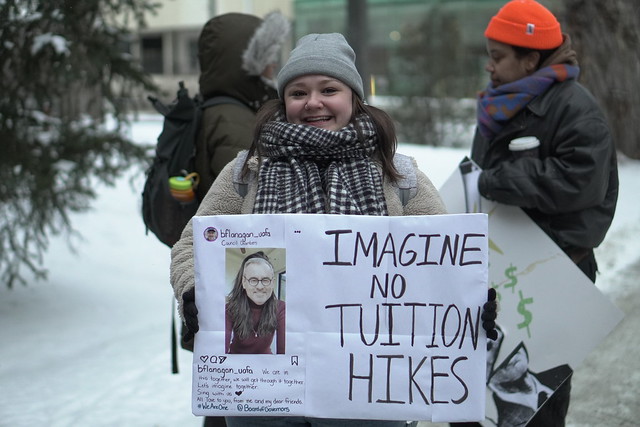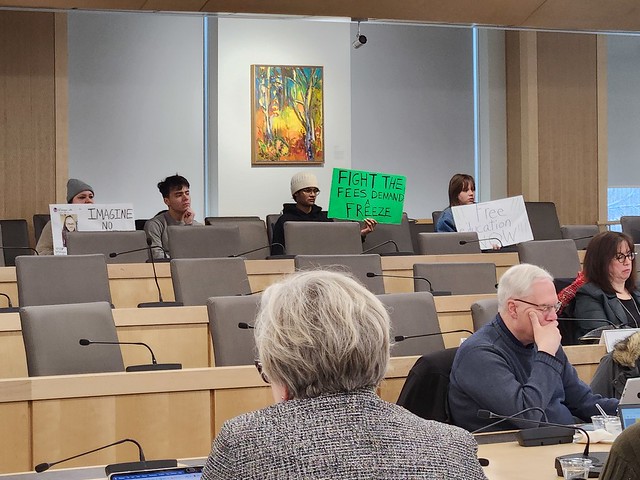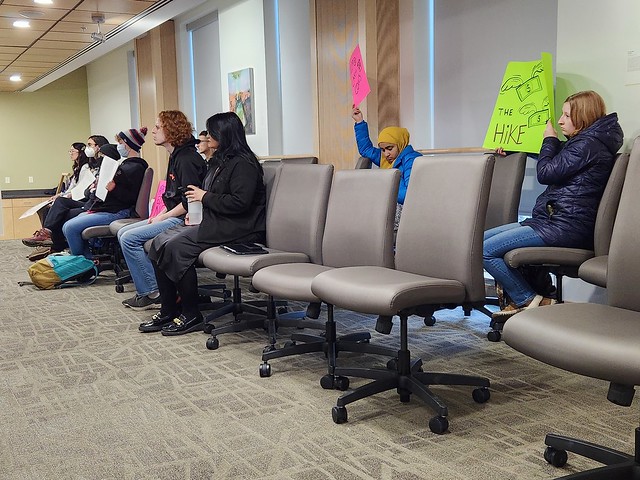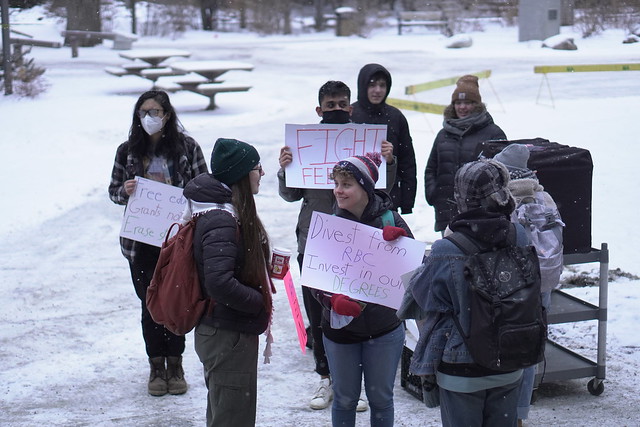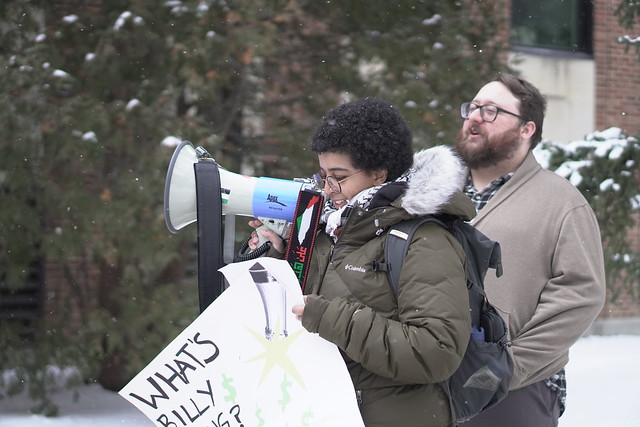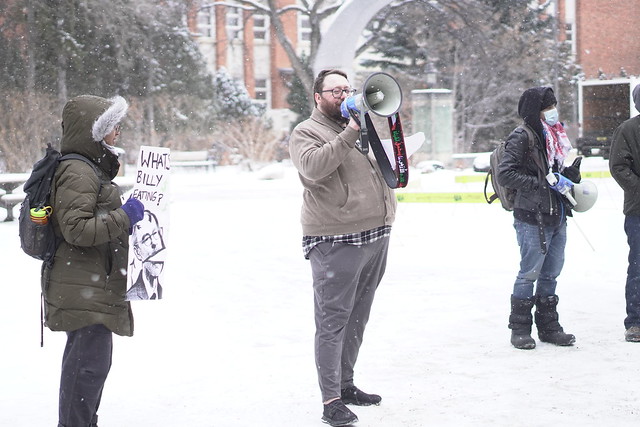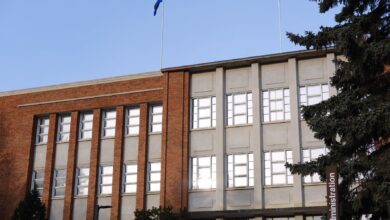BoG approves tuition increases for the fifth consecutive year
While the Board of Governors meeting took place, students held a protest outside the entrance to University Hall.
 Lily Polenchuk
Lily PolenchukAt the March 22 Board of Governors (BoG) meeting, the University of Alberta’s proposed tuition increases were approved for the fifth year in a row. During the meeting, students protested both inside Council Chambers and outside the entrance to University Hall.
For 2024-25, domestic undergraduate and graduate students will see a tuition increase of two per cent. New international students entering in fall 2025 will see a five per cent increase, while international students entering the Faculty of Science will see an increase of 6.5 per cent. As well, international graduate students in thesis and course-based programs will experience a five per cent tuition increase.
Additionally, there will be a $1,000 increase to the international price adjustment amount for thesis-based graduate students. This brings the total amount from $4,000 to $5,000. This amount will be offset by an equal amount of financial support.
To enter the meeting, students had to present their OneCards to police officers stationed outside University Hall. Before the presentations began, Kate Chisholm, BoG chair, told protesters that “bad behaviour” would not be tolerated. As well, Gateway reporters were told not to record or take photos during the meeting.
Chisholm also noted that she received 904 emails as a part of the Stop Tuition Increases email campaign.
Verna Yiu says 2 per cent tuition cap presents a “significant challenge for the university”
First, Vice-president (shared services and finance) Todd Gilchrist presented the budget. After Gilchrist, Vice-president (academic) Verna Yiu presented on the university’s proposed tuition increases. Following Yiu, Vice-president (facilities and operations) Andrew Sharman presented on the ancillary budget.
In his presentation, Gilchrist said that in the Government of Alberta’s Budget 2024, the U of A’s Operating Programs Support Grant remained at $136.6 million. According to Gilchrist, when compared against inflation and cost pressures, this is essentially a cut.
Next, Yiu thanked the U of A Students’ Union (SU) and the Graduate Students’ Association (GSA) “for their collaboration to ensure a comprehensive and productive consultation cycle.” She said this year’s consultation process involved conversations with the SU, the GSA, the International Student’s Association (ISA), and with students through tuition town halls.
In addition to proposing tuition increases, Yiu said the university is proposing to re-invest 15 per cent of domestic tuition into student financial support.
Yiu also discussed the universities proposal of increasing the international financial support offset from 7.55 per cent to 8.55 per cent to support students in need. Beginning in fall 2025, 8.55 per cent of total international tuition would be re-invested into student financial support. For fall 2024, the international financial support offset will remain at 7.55 per cent.
Based on early estimates, Yiu said the one per cent increase in 2025 will generate an additional $1.7 million in revenue for financial support for international students.
In 2023, the Government of Alberta introduced a 2 per cent tuition cap. Yiu said this cap presents a “significant challenge for the university.” This cap amounts to a cut when compared against the consumer price index (CPI), which measures the average change in prices, Yiu said. She added that estimates for CPI in fall 2024 are at 4.97 per cent. Currently, the U of A estimates a loss of $7 million in 2024-25.
Raitz asks how the university will support international students beyond what they have already proposed
Stephen Raitz, undergraduate BoG representative, noted that the increased international student tuition offset will not take effect until fall 2025. He said the SU had already brought forward concerns that this would not address student needs in 2024.
“I’m just wondering what we’re doing beyond what’s already been done or set in this specific budget for international students. We know that the need is compounding, and the affordability concerns are growing.”
As well, Raitz asked why SU proposals regarding international students had not been accepted.
Yiu responded that BoG received the proposal less than two weeks before the March 22 meeting. Still, they are “very keen to actually review the issues that would have been highlighted.” Yiu said they would consider many of the SU’s ideas for the upcoming year.
GSA President Bishoi Aziz said the GSA polled U of A graduate students, asking them if they considered ending their studies due to financial reasons in the previous year. According to Aziz, over 40 per cent of surveyed students said yes. Aziz asked what the university’s plans are to find alternative revenue sources.
Yiu responded that the university is in “a very unenviable position” of trying to meet increasing costs without the additional revenue to offset them.
SU president Christian Fotang says university has the ability to do better for students
In a statement during the discussion period, SU President Christian Fotang said he’s heard from students about how tuition increases have affected them. Although Fotang said he recognizes the financial difficulties the university is experiencing due to cuts from the provincial government, he said the university has the ability to do better for students.
As well, Fotang said the SU needs more specific information to be collaborative partners and to make the best decisions possible for U of A students. He said there is time to implement student suggestions and other proposals before fall 2024.
“I’ve seen this university at its best be able to do and implement a lot of strong recommendations. Whether it’s from students, professors, or administration itself.”
Fotang said he could not “in good spirit or good faith vote on these proposals knowing that there are things that we could have done to investigate and better support students on our campus.”
In response, Yiu said the university wanted to continue the dialogue between BoG, the SU, and the GSA. She also said that if there are gaps in information, BoG would need to know what they are. She said BoG wants to be “as transparent as possible with students when it comes to these types of important decisions.”
Later, Raitz gave a statement. Based on questions asked earlier and the fact that BoG didn’t integrate any of the SU’s proposals, Raitz said students will “fall in the cracks.” Raitz said he was unable to support the proposed tuition increases as it does not align with the universities best interests.
All proposed tuition increases approved by BoG
BoG Chair Kate Chisholm presented five motions in total, four of which were related to tuition. The first was to approve the proposed tuition increases for domestic undergraduate and graduate students, and that 15 per cent of domestic tuition increases be re-invested in student financial support.
Five people opposed this motion: Aziz, academic staff representative Heather Bruce — appointed by the Association of the Academic Staff of the U of A (AASUA) — Fotang, Raitz, and academic staff representative Dr. Dilini Vethanayaham — appointed by General Faculties Council (GFC). The motion passed.
The second motion was to approve tuition increases for incoming international students for fall 2025. Six members voted against this motion: Aziz, Bruce, non-academic staff representative Stephanie Dickie — appointed by the Non-Academic Staff Association (NASA) — Fotang, Raitz, and Dr. Vethanayaham. The motion passed.
The third motion was to approve the international tuition offset from 7.55 per cent to 8.55 per cent. This would take effect in fall 2025. With no opposition, the motion passed.
The fourth motion was to approve a price adjustment for international students in thesis-based programs from $4,000 to $5,000, understanding that this amount would be offset by an equal amount of financial support. No one opposed, and the motion passed.
Melissa Padfield says increasing tuition will allow the university to invest in program delivery for students
In an interview with The Gateway shortly after the proposals passed, Melissa Padfield, deputy-provost (students and enrolment), spoke about the choices behind the tuition proposals.
Padfield was on the Tuition Budget Advisory Committee and conducted a number of town halls. Padfield said her job is to connect with students, support proposal development, and work with students on recommendations they bring forward.
The Gateway asked Padfield if she had a response to Raitz’ comment that students may “fall in the cracks” as a result of the proposals. According to Padfield, when thinking about tuition, the university is also thinking about student financial support. As such, it was “critical” to have the tuition offsets for domestic and international students part of the proposal, Padfield said.
Additionally, Padfield said the university has worked to align bursary amounts with the cost of a moderate standard-of-living. According to Padfield, the U of A had the second-highest bursary amount in the entire country.
Raising tuition is an important way for the university to “make up some of that shortfall that’s created by inflation,” Padfield said. She added the U of A wants to continue to be a quality institution and for a U of A degree to continue to hold a lot of weight.
“[Increasing tuition] allows us to keep investing in things that are important to students around their program delivery, because that’s where the money from tuition goes.”
Protestors outside “tired of being treated as … cash cows,” push for Government of Alberta to foot U of A’s budgetary costs
Students gathered outdoors to protest the proposals while the BoG meeting occured. Organized by the Alberta Public Interest Research Group (APIRG) and the SU, approximately 20 people attended the protest. Members of the Youth Communist League (YCL) were also in attendance.
While addressing attendees in his opening speech, Tristan Turner, APIRG’s director of operations, mentioned that this year’s protest was going to be “mostly a disorganized event” without regulated speeches. He encouraged students to approach organizers if they had something to say.
“We’re here today to be loud, to let the BoG know that we’re pissed off. We’re tired of being treated the way we are — as cash cows,” Turner said.
Passersby could hear protestors chanting “halt the hikes, fix the pipes. No more money for Flanagan’s flights.”
Later, Fotang thanked protestors for attending the event before he entered the meeting.
“We’re here to fight for the students who wish they could be here to say how they feel. That are out working multiple jobs because of the increasing and insane fees,” Fotang said.
“It’s not possible for us to have a quality education anymore at this institution. And we’re fed-up about it,” Turner says.
In an interview with The Gateway, Turner said he attended the event to “stand in solidarity with students” in the current economic landscape.
“It’s no longer sustainable or possible to be a student, meaningfully survive, and have quality of life in Edmonton,” Turner said.
Turner added that the quality of education at the U of A has also taken a hit due to deferred maintenance and low staff wages.
“It’s not possible for us to have a quality education anymore at this institution. And we’re fed-up about it.”
Samir Mechel, a club organizer with the University of Toronto’s YCL, was at the event. Although Mechel is not a U of A student, he wanted to attend the protest while visiting Edmonton.
“We have the same issues with tuition hikes in Ontario where I’m from. Luckily, we have a tuition freeze there right now,” he said.
Mechel added that the majority of the university’s budget costs should be paid for with government funding, to decrease costs for students.
Students are experiencing a “sense of hopelessness,” protestor says
Océanne Kahanyshyn-Fontaine and Tessa Yakimchuk, two students who attended the protest, said they had felt annoyed, frustrated, and disappointed that the proposal passed.
When asked how she felt about the turnout, Kahanyshyn-Fontaine said she wished there were more students protesting.
“It’s just sad. I get that it’s early on a Friday, so it’s hard to make yourself go,” she said.
Yakimchuk added that students are experiencing a “sense of hopelessness.”
“They’re just gonna raise tuition no matter what we do. So is there even any point in going to something like this?”
However, Kahanyshyn-Fontaine said that students should still involve themselves in these conversations.
“I’m still disappointed in student interaction and involvement with the issue. People have to be more involved with their tuition but even more involved with issues on campus. And I think that recently, that hasn’t been very good.”
“We had one more vote on our side. That’s one more person than last year and it shows that we’re sustaining that momentum,” Fotang says
After BoG approved the proposed tuition increases, Fotang came outside to tell protesters. He mentioned there was more support for students this year.
“We had one more vote on our side. That’s one more person than last year, and it shows that we’re sustaining that momentum,” Fotang said. “We’re keeping them on their toes. We’re keeping them angry. And I want you to keep coming out.”
The Gateway asked Fotang about his initial reaction to BoG’s decision. Fotang said seeing an additional vote against increases inspired him.
“It shows that even some people on the BoG are getting frustrated. They can’t keep using the same tired excuses.”
Fotang added that the university must start coming up with creative solutions, as it’s not sustainable to increase fees “year over year” while students are responding with heightening “levels of anger.”
“If not … it’s going to create a bunch of alumni who are going to come out knowing that they were never supported. They never felt the university had their back,” Fotang said. He questioned why then current students as alumni would “donate or come back and help make this a better place?”
“The SU was not very engaged this year in organizing and planning the protests,” Turner says
According to Fotang, the SU organized events to show opposotion to tuition increases leading up to the protest. This included tuition town halls and a letter-writing campaign, in which 4,698 students wrote letters to the Government of Alberta and U of A administration.
“We’re really happy with some of the grassroots organizing that also took place, whether it was from APIRG and the Halt the Hike movement,” Fotang said.
The Gateway asked Turner what he thought of the turnout at this year’s protest. He said that last year’s protest was larger due to a strong group of grassroots volunteers, who had “more structure and energy behind them.”
Turner mentioned that APIRG did most of its outreach online over social media.
“Ultimately, organizing protests like this is the responsibility of student government on campus. And the SU was not very engaged this year in organizing and planning the protests. They were a little bit more engaged last year, so that definitely had a part to play.”
However, Turner is hopeful of the incoming group of student executives.
“There’ll be a more activist and organizing-oriented SU. And we’ll be able to access those resources to make sure these events are more successful.”
The Gateway asked incoming SU vice-president (student life) Renson Alva what he thought about the SU’s outreach for the protest.
“It did seem … too little too late,” Alva said. “They were emphasizing that SU proposals came in just two weeks before.”
Alva said he “expect[s] more turnout” next year and wants “to make sure that [the SU is] not late to the party.”


